Processed sugar is a potent energy source. It causes a variety of changes in your body.
You may have heard that sugar can feed cancer cells. Is that true?
Sugars ‘Nourish’ Cancer Cells
For cancer patients, “sugar intake can indeed nourish cancer cells,” Mingyang Song, associate professor of clinical epidemiology and nutrition at the Harvard T.H. Chan School of Public Health, told The Epoch Times.
This is supported by strong epidemiological evidence, he said.
A study published in PLoS One involving 1,011 colon cancer patients with a follow-up period of over seven years found that compared to patients consuming less than two servings of sugar-sweetened beverages per month, those who consumed two or more servings per day experienced a 67 percent increased risk of colon cancer recurrence or mortality.
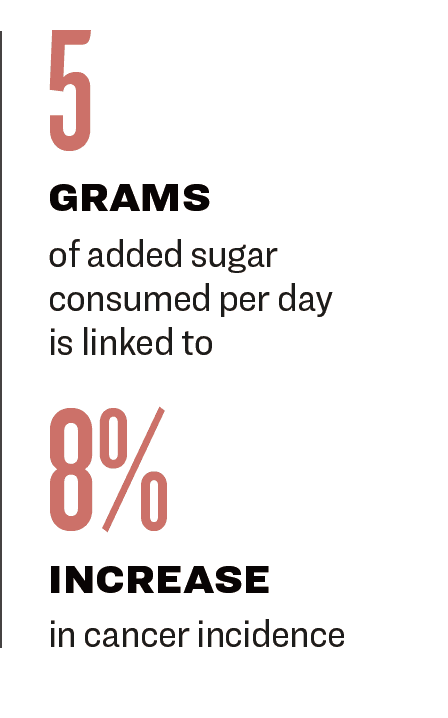
Another Spanish study published in Clinical Nutrition in 2021 involving over 7,000 participants found that for every additional 5 grams of sugar consumed in liquid form per day, cancer incidence increased by 8 percent. People with the highest intake experienced a 46 percent increase.
A can of soda usually contains 30 to 45 grams of sugar.
A shift in a population’s sugar consumption can significantly affect cancer rates. Lewis Cantley, a well-known biologist and professor of cell biology at Harvard Medical School, used Taiwan as an example in an email to The Epoch Times. He wrote that before World War II, Taiwan had relatively low rates of cancers, including colon, endometrial, and breast. That was when sugar-sweetened beverages were scarce. Then, in the 1960s and 1970s, with the introduction of Western diets—particularly sugary drinks—cancer rates there steadily began to rise. They’ve now reached a level comparable to those in the United States.

Soft drinks on shelves in Riga, Latvia. Sugary drinks are prevalent across the world. (Tanya Keisha/Shutterstock)
Cancer cells require a substantial amount of glucose to survive. In the 1930s, Otto Warburg, a German biochemist, discovered that both cancer cells and normal cells require sugar, but their metabolic pathways differ: Normal cells primarily convert glucose into energy through aerobic respiration, while cancer cells obtain energy through glycolysis instead of using oxygen.
Cancer cells produce very little and inefficient energy due to their unique method of metabolizing sugar, which is why they voraciously consume sugar—at a rate 200 times faster than normal cells. That appetite can have wide-ranging effects.
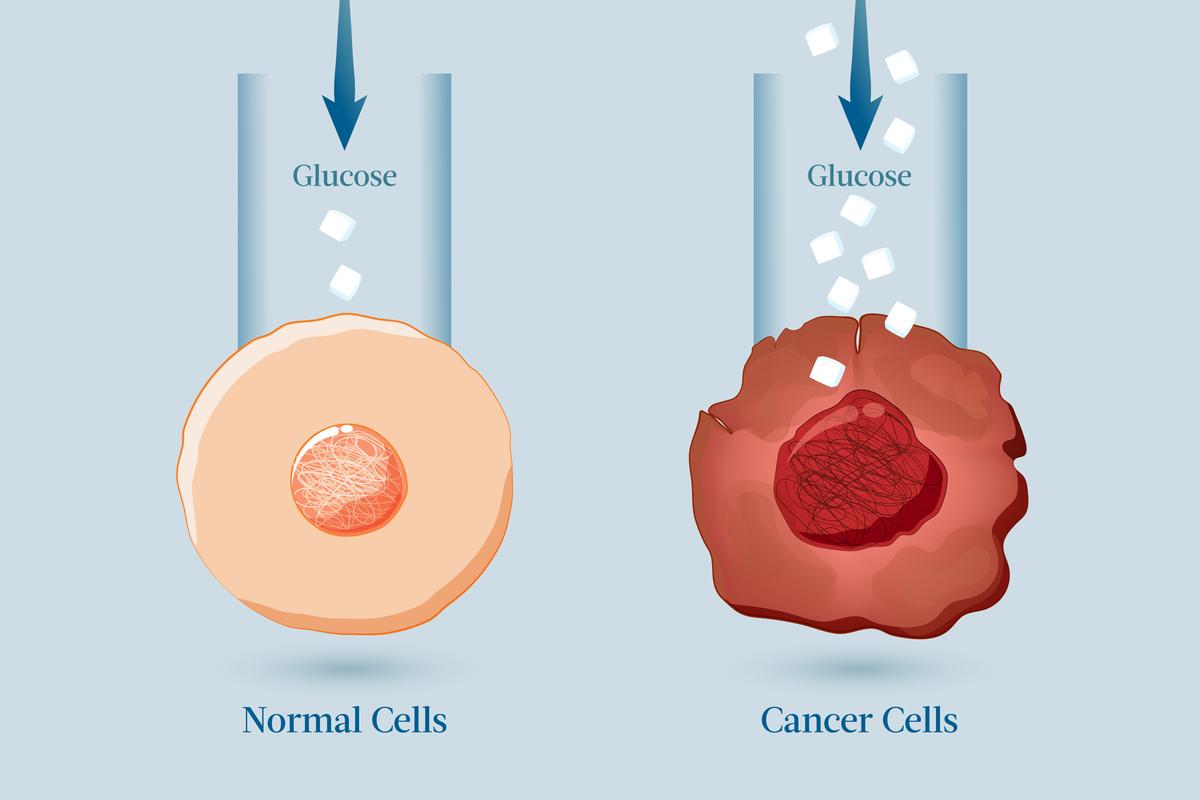
“Cancer cells, in some sense, hijack metabolic processes in the body,” Lorenzo Cohen, professor and director of the integrative medicine program at MD Anderson Cancer Center and author of “Anticancer Living,” told The Epoch Times.
Sugar–Obesity–Cancer: A Prevailing Theory
“The relationship between sugar and cancer is a complicated one,” said Dr. Jeremy Kortmansky, associate professor of medical oncology at the Yale School of Medicine and clinical director of the Division of Gastrointestinal Medical Oncology at the Yale Cancer Center.
The prevailing theory is that sugar doesn’t directly cause cancer but rather indirectly contributes to it through obesity.
High energy intake, or too many calories, and low energy expenditure are primary risk factors for many types of cancer, Ellen Kampman, a nutritional epidemiologist and chair in nutrition and disease at Wageningen University in the Netherlands, told The Epoch Times. A high sugar intake in the diet increases energy intake.
“Keeping a healthy weight is the most important thing you can do to prevent cancer,” she said.
A prospective study with over 35,000 participants revealed that people who consumed sugar-sweetened soft drinks more than once per day had an 18 percent increased risk of developing obesity-related cancers than those who rarely consumed such drinks.
A comprehensive review published in Cancers in 2023 indicated that about 48 percent of cancer cases are attributed to obesity. Obesity is linked to 13 types of cancer, including breast, colorectal, endometrial, liver, stomach, and thyroid.
A high-sugar diet can lead to the accumulation of body fat, especially visceral fat. Scientists recognize that the role of fat goes beyond energy storage; it acts as a highly active endocrine organ capable of secreting various substances, including hormones. Excessive fat can lead to an imbalance of these substances, contributing to cancer development.
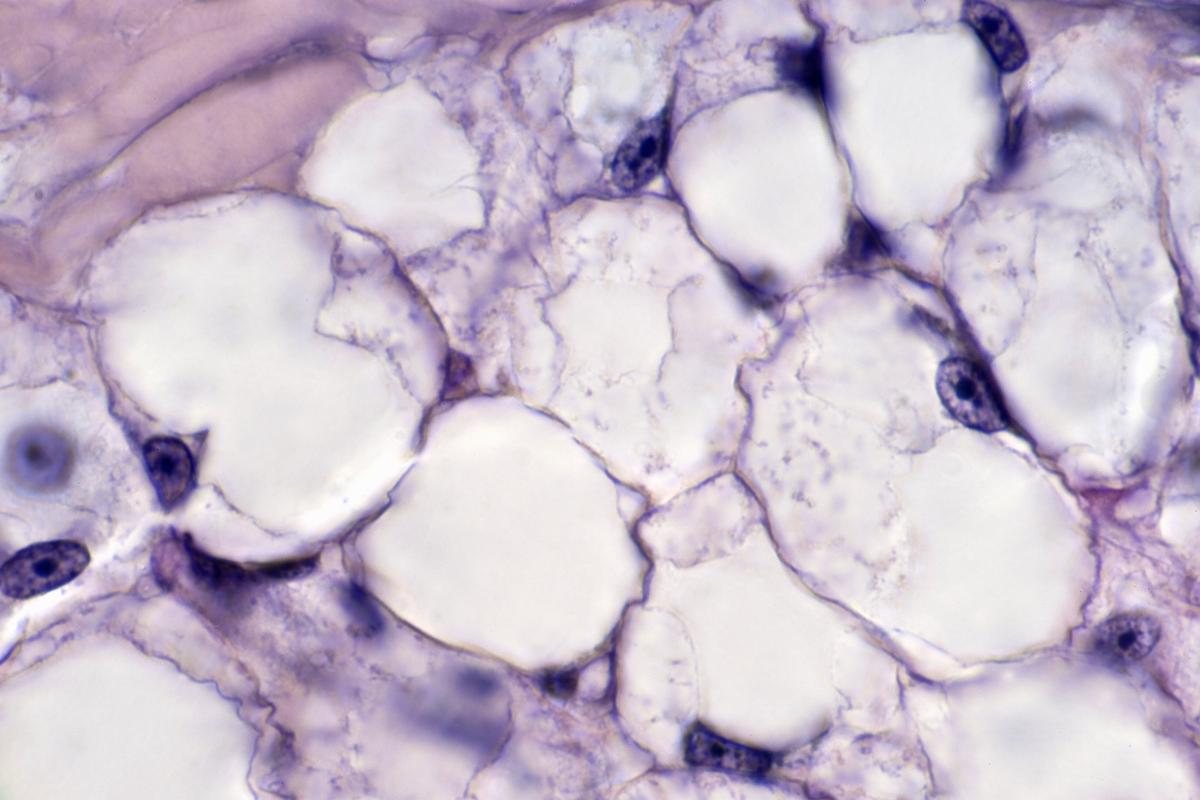
However, there are many other ways that sugar could contribute to cancer, according to experts and various studies.
A Challenging Problem
Proving a direct link between eating sugar and cancer is challenging because of ethical concerns and practical difficulties in conducting such experiments.
“I certainly would not want my children to be in such a trial,” said Mr. Cantley, whose work has significantly impacted cancer cell biology.
Nevertheless, prospective cohort studies—a type of observational study focused on following a particular group of people over a period of time without interfering with their eating habits—can provide valuable insights into the relationship between sugar intake and cancer risk.
One such study, published in The American Journal of Clinical Nutrition in 2020, tracked over 100,000 French adults for several years. Those who consumed the most sugar had a 17 percent increased cancer risk compared to those with the lowest sugar intake. This elevated risk was particularly notable for breast cancer, with a 51 percent increase.
This association remained significant even after adjusting for factors such as weight gain and body mass index. The study suggested that sugar may increase cancer risk through mechanisms other than just weight gain.
The Many Ways Sugar May Lead to Cancer
Processed sugar is a potent energy source. Beyond weight gain, it causes a variety of changes in your body that increase cancer risk.
Alters Metabolism
“Another mechanism through which sugar increases the risk of cancer is its impact on metabolism,” Mr. Song said.
High sugar intake can alter the metabolic profile, triggering inflammation and insulin resistance, both risk factors for tumor development.
This is a major mechanism that causes cancer, independently of obesity, he said. Obese people are more prone to inflammation and insulin resistance, but these can also occur in lean individuals.
Sucrose, fructose, and refined carbohydrates cause a significant spike in blood sugar levels. To maintain sugar balance, the body must increase insulin accordingly, and “excess amounts of increased insulin are inflammatory,” according to Mr. Cohen.
Thomas Seyfried, a professor of biology at Boston College, told The Epoch Times that high blood sugar is linked to systemic inflammation, which can lead to mitochondrial damage and, ultimately, cancer.
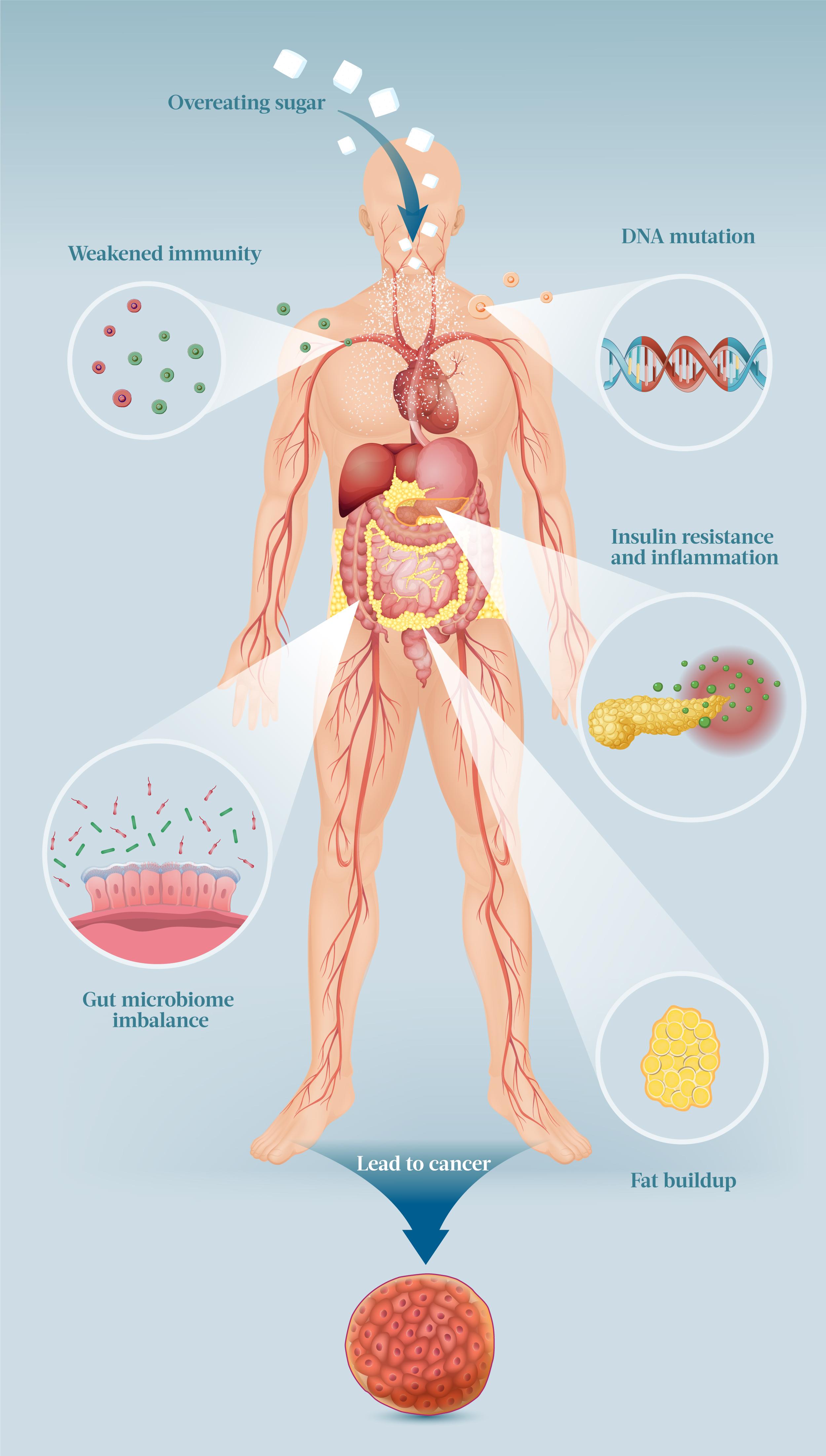
Sugar causes a variety of changes in your body that ultimately lead to increased cancer risk. (Illustration by The Epoch Times, Shutterstock)
Triggers DNA Mutation
Inflammation and insulin resistance can also directly promote mutations in cell genes, leading to alteration in cell behavior.
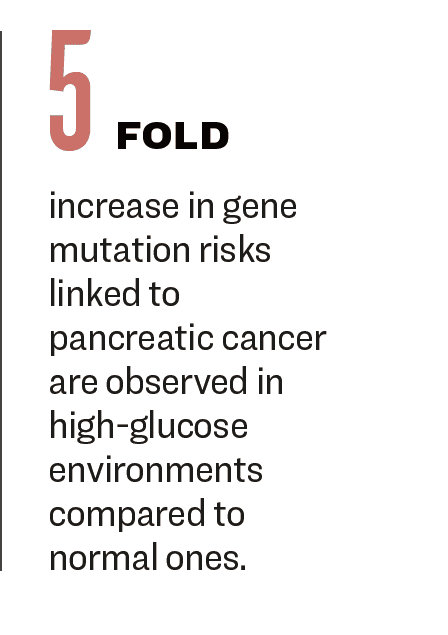
Mr. Song further explained that the normal cell life cycle is disrupted in such cases. Cells don’t undergo normal timely cell death, instead growing and proliferating without limits, fueling tumor development.
Many experiments have confirmed these mechanisms. For example, mutations of genes related to insulin signaling can contribute to tumor development in various tissues, increasing the risk of certain types of cancers, including breast, endometrial, and thyroid.
A study published in Cell Metabolism found that the likelihood of gene mutations leading to pancreatic cancer increases fivefold in a high-glucose environment compared to a normal one.
Affects Gut Microbiota
“Only in recent years have people started to recognize the significance of gut microbiota [in relation to cancer risk],” Mr. Song said.
Sugar can disrupt the structure and function of gut microbiota and replace beneficial bacteria with harmful ones, ultimately resulting in the development of tumors in the intestines and even elsewhere.
Mr. Song explained several mechanisms by which the gut microbiome affects tumor development. These have also been a focus of recent research.
Sugar can increase certain harmful bacteria, which produce carcinogenic proteins on their surfaces, leading to gene mutations and directly promoting tumor development. Some harmful gut bacteria can also affect metabolism, causing uncontrolled cell growth.
Additionally, certain gut bacteria can harm the immune system, compromising its surveillance function. They may also produce specific metabolites that, upon entering the bloodstream from the gut, induce inflammation and immune dysregulation at distant sites, ultimately contributing to the development of tumors in those areas.
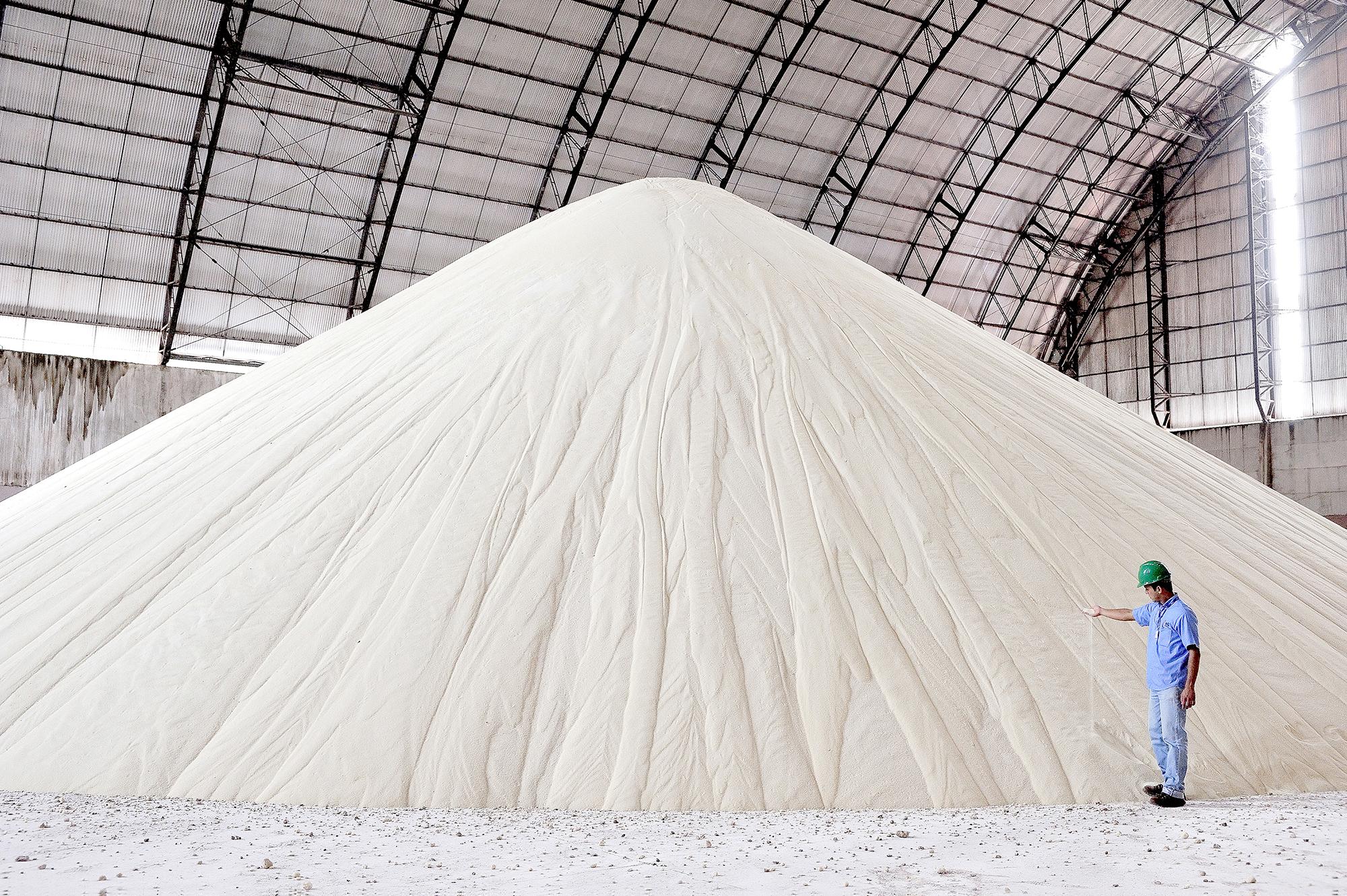
Sugar stored in the warehouse at a sugar mill and ethanol manufacturing plant in Minas Gerais, Brazil. (T photography/Shutterstock)
Undermines Immunity
Under normal circumstances, the immune system is responsible for clearing out problematic cells and maintaining a state of equilibrium. Overeating sugar for a prolonged period can disrupt this equilibrium, rendering the immune system unable to resist mutated cells or other pathways that promote cancer development.
Generally, experts believe that sugar affects processes related to cancer, such as inflammation, glucose metabolism, lipid metabolism, and immune regulation. “I think obesity is just a byproduct [of these processes],” Mr. Cohen said.
According to Dr. Kortmansky, more extensive research is needed to better understand the potential pathways through which sugar might affect cancer.
Fructose: The Most Dangerous Sugar
Among the theories exploring the potential link between sugar and cancer, scientists emphasize the effects of fructose, in particular, on the body.
When we refer to “sugar” in general, we’re often talking about sucrose, Dr. Jason Fung, a nephrologist with a long-standing focus on Type 2 diabetes and intermittent fasting, told The Epoch Times.
A sucrose molecule consists of one glucose molecule and one fructose molecule. Every cell in the body can absorb glucose and use it as an energy source. However, fructose molecules aren’t used by any cells in the body. Instead, they enter the liver directly, where some are essentially converted into fat, leading to increased insulin resistance.
Researchers at the MD Anderson Cancer Center conducted an animal experiment in which they injected breast cancer cells into mice, which they fed different diets. Mice on starch-based diets had a 30 percent tumor development rate, while those on sucrose-based diets had a rate exceeding 50 percent. These mice had larger tumor masses, and lung metastasis was more common.
The researchers further discovered that among several diets based on sucrose, glucose, fructose, and a combination of glucose and fructose, the mice on the fructose-based diet exhibited the most severe conditions, with the highest breast cancer tumor weight and the most aggressive tumor growth. Cancer metastasis was also more common.
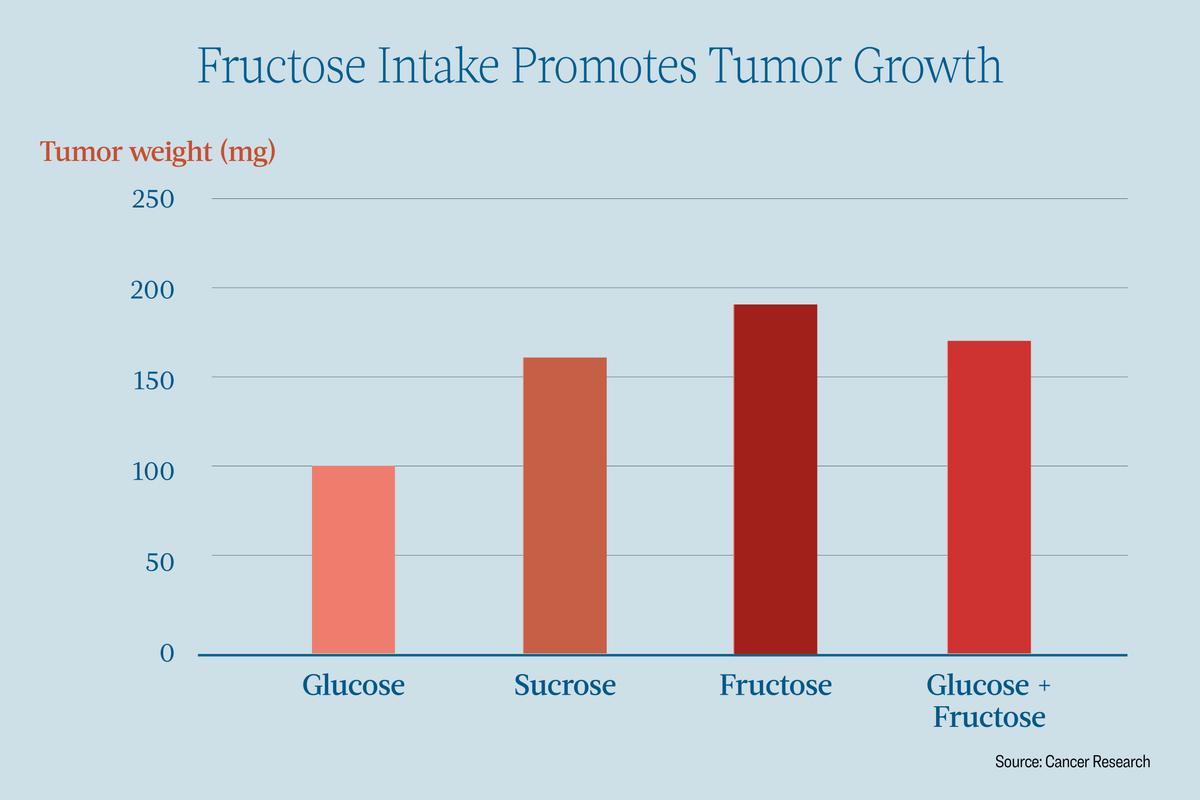
“Fructose and glucose are processed very differently in the body,” said Mr. Cohen, who was involved in the study. This experiment demonstrated that fructose directly promotes the growth of breast cancer.
Another study indicated that high-fructose corn syrup, another commonly used added sugar in processed foods and beverages, directly promotes the growth and progression of colorectal cancer tumors.
High-fructose corn syrup, comprised of 45 percent glucose and 55 percent fructose, is frequently used in soft drinks and other sweetened foods.
Mr. Cantley, who led this study, said that in recent years, there was “a dramatic increase” in colorectal cancer among younger populations, which is associated with the sharp rise in how much high-fructose corn syrup people have started consuming over the past half-century.
The study from Spain mentioned earlier discovered that the consumption of liquid sugars is linked to a more significant increase in cancer risk than the consumption of solid sugars, especially liquid fructose and fructose in fruit juices. A high intake of liquid fructose was associated with the highest increase in cancer mortality.
Fructose in processed food and drinks differs from fructose in actual fruits. When eating an apple, you consume small quantities of fructose with fiber, slowing digestion.
But drinking an 8-ounce bottle of apple juice is like consuming the sugar from three to four apples all at once, Mr. Cohen said.
“I do recommend that people who are at risk focus on a diet that is low in added sugar and then a lifestyle that is high in physical activity,” Dr. Kortmansky told The Epoch Times. “That’s the best way to control the sugar that is in our system.”
